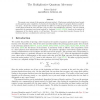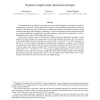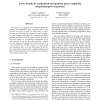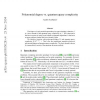131 search results - page 2 / 27 » Adversary lower bounds for nonadaptive quantum algorithms |
COCO
2008
Springer
13 years 7 months ago
2008
Springer
We present a new variant of the quantum adversary method. All adversary methods give lower bounds on the quantum query complexity of a function by bounding the change of a progres...
STOC
2007
ACM
14 years 5 months ago
2007
ACM
The quantum adversary method is one of the most successful techniques for proving lower bounds on quantum query complexity. It gives optimal lower bounds for many problems, has ap...
COCO
2004
Springer
13 years 10 months ago
2004
Springer
We prove a very general lower bound technique for quantum and randomized query complexity, that is easy to prove as well as to apply. To achieve this, we introduce the use of Kolm...
WDAG
2010
Springer
13 years 3 months ago
2010
Springer
We present a scalable quantum algorithm to solve binary consensus in a system of n crash-prone quantum processes. The algorithm works in O(polylog n) time sending O(n polylog n) qu...
FOCS
2003
IEEE
13 years 10 months ago
2003
IEEE
The degree of a polynomial representing (or approximating) a function f is a lower bound for the quantum query complexity of f. This observation has been a source of many lower bo...




